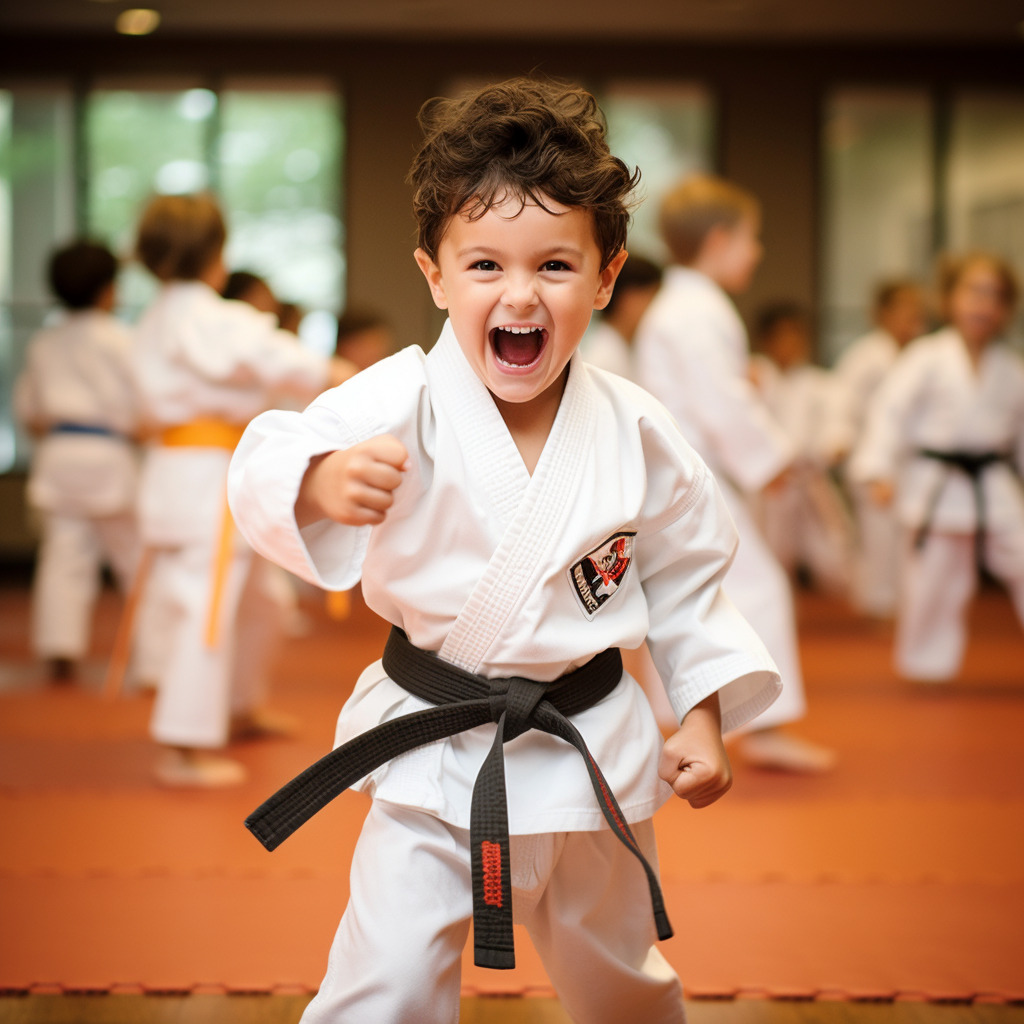Karate bildet eine sehr beliebte Alternative für Kinder, die Spaß an der Bewegung haben, jedoch kein Interesse an Fußball zeigen. Ab welchem Alter kann man starten, sollten Kinder tatsächlich eine Kampfsportart erlernen und welche Begleiteffekte bringt Karate noch mit sich – wir sagen es Euch in diesem Beitrag.

Ab welchem Alter ist Karate für Kinder geeignet?
Wir kennen alle das Bild aus den Filmen, wenn ein Dojo mit 60 Kindern gefüllt ist, die auf Anweisung des Sensei Techniken trainieren. Dieses Bild ist, im Gegensatz zu vielen anderen Hollywood-Erfindungen, genau in dieser Form auch in Deutschland anzutreffen.
Kinder ab 4 Jahren können am Karate Training teilnehmen – sollte nach einer Einzelfall-Prüfung nichts dagegen sprechen.
Können sich Kinder mit Karate verteidigen?
Karate ist eine wirksame Kampfsportart zur Selbstverteidigung. Natürlich wird sich ein kleines Kind auch mit Kenntnissen in Karate nicht zwangsläufig gegen einen Erwachsenen wehren können.
- Die Grundtechniken zur Abwehr werden durch Fuß- und Armtechniken beigebracht. So kann ein Schlag zumindest ins Leere geleitet werden
- Angriffstechniken werden sicherlich aufgrund der mangelnden Kraft sowie Reichweite keine größere Wirkung entfalten.
- Aber letztendlich gibt Karate Selbstvertrauen, kann helfen Angriffe abzuwehren und Zeit für eine Flucht zu bieten.
Wenn ihr euch das noch nicht so genau vorstellen könnt, schaut euch die folgenden Videos an.
Karate Kinder Videos
Im Video ein 7 jähriges Mädchen bei einer Karate Kata.
Im Video ein 9 jähriges Karate-Kind bei einer Talentshow.
Im Video sind Kinder von 4 bis 6 Jahre beim Karate Training zu sehen:
Wie entscheiden Trainer ob ein Kind geeignet ist?
Die Beurteilung ob ein Kind für das Karatetraining geeignet ist, treffen Trainer und Eltern gemeinsam. Der Trainer wird seine Entscheidung vor allem an zwei Fragestellungen knüpfen:
- In erster Linie hat der Verein ein Mindestalter, welches meist bei 4 oder 5 Jahren liegt. Dieses Mindestalter soll die Kinder vor Verletzungen schützen, die sie sich selbst oder anderen Kindern beibringen könnten.
- Darüber hinaus kommt es aber selbstverständlich auch auf das einzelne Kind an. Deshalb wird der Trainer auch die geistige Reife jedes neuen Schülers beurteilen, wenn das Mindestalter nicht oder nur knapp erreicht ist, bevor dieser in den Verein aufgenommen wird. Es geht darum, ob das Kind überhaupt möchte, ob es sich in Gruppen integrieren lässt etc. Im Zweifelsfall wird eine Nachfrage beim Verein also nicht schaden.
Welche Vorteile haben Karate Kinder?
Ist eine Kampfsportart für Kinder wirklich sinnvoll? Man darf es nicht nur auf die Kampfsportart reduzieren.
- Denn Karate Kinder verfügen über eine große körperliche Fitness, der Kontakt mit Trainern und älteren Schülern beeinflusst die Persönlichkeitsentwicklung und soziale Interaktion beim Partnertraining hilft vielleicht sogar dabei, Freundschaften zu schließen. Alles in allem ist Karate Kindertraining also durchaus eine empfehlenswerte Alternative zum Fußballverein.
- Genau wie beim Judo für Kinder, bildet auch Karate den Körper und Geist gleichermaßen und kann somit dazu beitragen, dass Euer Kind nicht nur bessere Sportnoten mit nachhause bringt, sondern auch ein besseres Verständnis der Konsequenzen von Gewaltanwendung gegen Menschen erlangt. Das bedeutet, dass Kinder, welche Kampfsporttraining haben, in Konfliktsituationen meist noch einmal mehr nachdenken, wenn Altersgenossen schon längst versuchen, sich körperlich durchzusetzen.
Diese Einstellung, körperliche Gewalt nur zur Verteidigung und nicht zum Angriff einzusetzen, entsteht aus den Grundregeln des Karate, die ein Trainer eindringlich vermittelt.
Bestehen auch Gefahren?
Selbstverständlich gibt es beim Karate, wie bei jedem anderen Sport, gewisse Stolpersteine, die Ihr aber durch Beobachtung und eine eventuelle Rücksprache mit dem Trainer größtenteils umgehen könnt.
- Die größte Gefahr liegt wohl, besonders am Anfang, in der Überforderung Eures Kindes. Es fällt so manchem „Stubenhocker“ sehr schwer, sich an das Leistungsniveau der Gruppe anzupassen. Hier müsst Ihr allerdings zwischen einer wirklichen Überforderung Eures Kindes und dessen Unlust „etwas zu verändern“ unterscheiden. Dieses Problem sollte sich aber schnell von selbst lösen, sobald er oder sie den Spaß an der Sache entdeckt und Freunde gefunden hat, weil er oder sie dann vollkommen freiwillig zum Training gehen wird.
- Eine weitere Gefahr besteht in der sozialen Interaktion mit anderen Kindern, speziell beim Partnertraining. Hier kann es, wie bei vielen Kindern im gleichen Raum üblich, schon einmal zu Reibungen kommen, deren Beseitigung aber für den Trainer, genau wie für die älteren Schüler, zum Trainingsalltag dazugehört.
- Eine weitere Gefahr, wenn auch eine sehr kleine, besteht in der Verletzung. Es kommt zwar sehr selten vor, kann aber nicht gänzlich ausgeschlossen werden, dass eine ernsthafte Verletzung, beispielsweise durch eine ungünstige Bewegung, auftritt. Zu 99% treten beim Karate Kindertraining allerdings nur die üblichen Zerrungen und Prellungen auf, wie sie bei einer körperlich derart aktiven Sportart leider unvermeidlich sind. Dies wiederum ist aber auch beim Fußballverein nicht anders.
Fazit zu Kindern in Kampfsportarten
Ob die eigenen Kinder bereits im jungen Alter eine Kampfsportart erlernen sollten oder nicht, bleibt ein Streitthema. Unserer Meinung nach gibt es dabei drei wichtige Punkte, die jeder für sich abwägen sollte.
- Auf der einen Seite ist es eine Sportart wie jede andere auch und hilft damit Körper und Geist des Kindes zu fördern. Jedoch sind für diesen Sachverhalt auch andere Sportarten zuträglich.
- Kampfsportarten sind darauf ausgelegt einen Angriff abzuwehren bzw. eine körperliche Auseinandersetzung für sich zu entscheiden. Das kann in einer Notsituation durchaus entscheidend sein.
- Der Umgang mit Gewalt ist unserer Meinung nach sogar ein Vorteil. Denn jeder gute Lehrer wird den Kindern erklären, dass Gewalt nichts Schönes ist und es nur ein Mittel der Selbstverteidigung darstellt. Daher kann dies sogar regulierend wirken und dazu führen, dass die Kinder besser damit umgehen können.
Wir vertreten die Meinung, dass die Vorteile bei einem Kindertraining in Karate deutlich überwiegen. Das Kind kann von körperlicher Fitness, Gruppendynamik und der Persönlichkeitsentwicklung nur profitieren.
- Boxsack Basics: Findet den perfekten Boxsack für euer Heimtraining - 23. November 2023
- Mobbing am Arbeitsplatz: Tipps & Hilfestellungen für Betroffene - 15. November 2023
- Wohnung & Haus effektiv vor Einbruch schützen: 10 Tipps & FAQ - 3. November 2023

